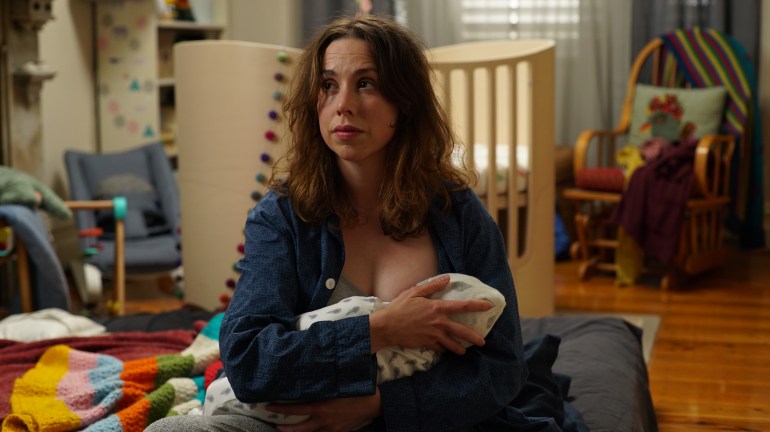Alison Bell in ‘The Letdown’.
Executive producer Julian Morrow regards The Letdown as Australian TV’s first comedy to deal with a young mothers’ group, and is surprised it’s taken so long to tackle the subject.
One reason is the long gestation for the six-part series produced by Giant Dwarf, which will premiere on the ABC and iview at 9.35 pm on Wednesday October 25, followed by Netflix worldwide in early December.
Sarah Scheller first floated the idea with Giant Dwarf’s Morrow in 2011, which led to a workshop the following year in which fellow actress Alison Bell joined the project as co-creator.
After Rick Kalowski, a friend of Morrow’s since their years at university studying law, was appointed as head of comedy at the ABC he suggested Scheller and Bell write a draft episode.
Subsequently The Letdown was one of six Comedy Showroom pilots which screened last year on the ABC as part of a joint initiative with Screen Australia, and it won the AACTA award for best TV screenplay.
The responses were so positive that the series was greenlit and Kalowski and Morrow secured the global streaming deal with Netflix.
The show is Bell’s first writing credit and Scheller’s second following Jungle’s No Activity.
“Through the extensive feedback, we were really able to understand what resonated with the pilot and what didn’t,” Scheller tells IF. “I’m not sure first-timers often get that luxury; it was invaluable. Ultimately, I’m very proud that the stories of these women are in the hands of us: two female writers.
“The story seemed to resonate strongly with so many women – those with and without children, and I knew (as did the ABC) that we had more stories to tell. Also, Alison’s performance was so strong I knew the ABC would be crazy not to commission it.”
Bell plays Audrey, who navigates the steep learning curve of motherhood as she deals with sleeplessness, issues with her mother Verity (Sarah Peirse) and her husband Jeremy (Duncan Fellows), who also struggles with parenthood and Catholic guilt as well as job uncertainty.

Sacha Horler plays Ester, a member of the mothers’ group who runs a financial services company. Lucy Durack plays Sophie, an over-zealous, perfectly groomed mother, Celeste Barber is Barbara, and a straight-talking, stay at home mum and Noni Hazlehurst is Ambrose, the unsympathetic maternity nurse who runs the mothers’ group.
Scheller says: “The inspiration for the pilot came about through our own personal experiences with new motherhood, but I guess more specifically it was after my own ill-fated encounter with a local mothers’ group that the idea began to percolate.
“Alison and I were both slightly disillusioned with how motherhood was portrayed on screen. It never seemed to go beyond the stereotypes. We wanted to explore the less stereotypical other notions of motherhood, such as not living up to expectations and what that meant for a woman and for her relationship. We already knew that motherhood is an obliterating experience for a woman, but what about when it is for her partner, her mother and closest friends?”
Bell agrees: “Bliss or post-natal depression. The joyful yet difficult, confronting, confusing in-between was rarely acknowledged.”
Scheller’s husband Trent O’Donnell was the obvious choice as the director. He had worked with Bell on Laid and with Giant Dwarf on The Chaser’s War on Everything.
The writers credit script editor Greg Waters with teaching them how to break the stories and the importance of inherent drama. His advice: You can always inject comedy later if you need to, but it’s infinitely more difficult to try to add drama after you’ve started writing the script.
The Netflix investment enabled the show to be made, a new financing model which lessens the dependence on the domestic broadcaster, Morrow says.
He notes the series has mined a potentially rich well of material, which would make a sequel very doable.
Scheller says: “Knowing it would be available on Netflix worldwide definitely influenced the tone of the show. We wanted a show that could easily translate across different platforms and markets. The subject matter is so universal and relatable we knew the show could have broad appeal and we also didn’t feel the need to be specific about the characters’ geography for the stories to work.”
Check back tomorrow for more from Julian Morrow on upcoming Giant Dwarf projects.



